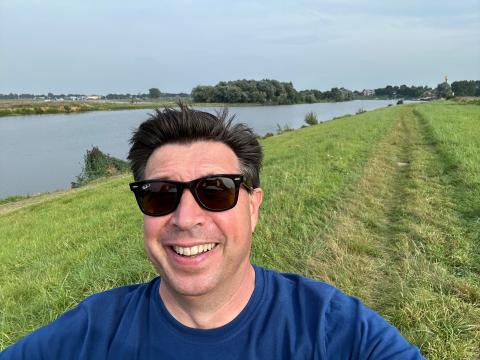European Economic
and Social Committee
Sport Accessibility: Pioneering Inclusive Sport for Visually Impaired People Across Europe
The Eye Association Netherlands (Oogvereniging), with the help of the European Blind Union (EBU)'s network, has launched the Sport Accessibility initiative, which seeks to offer practical solutions on how to remove barriers deterring blind and partially sighted people from joining sports clubs and associations in the EU. Disability activist and volunteer for Oogvereniging and EBU, Peter van Bleijswijk, tells us all about this ground-breaking collaborative project, which paves the way for truly inclusive sport. You can also help by responding to the survey on the accessibility of sport and recreational activities for visually impaired people in your corner of Europe.
By Peter van Bleijswijk
In the pursuit of true inclusivity in sport, the Sport Accessibility initiative from the Netherlands is breaking new ground by focusing on the unique challenges faced by blind and partially sighted people. This forward-thinking project aims to address and eliminate the barriers that prevent visually impaired people from participating fully in sports and physical activities in sports clubs and associations.
The project is built on a deep understanding of the obstacles these individuals face. After extensive research and previous experiments, Sport Accessibility has identified 10 major barriers, which include the availability of specialised coaching, buddy programmes, the physical accessibility of sports facilities and transportation issues. These barriers are often overlooked but play a significant role in preventing visually impaired people from enjoying the benefits of sport.
To tackle these challenges head-on, the initiative has introduced the concept of ‘Sport Proeftuinen’, or ‘Sport Labs’. These labs are set up in existing sports clubs or by partnering with sports providers, creating a real-world environment to test potential solutions. For each identified barrier, three different solutions are proposed and tested. The most effective solution is then refined and tested multiple times to ensure its practicality and effectiveness.
The findings from these experiments are compiled into a ‘Digital Sport Blueprint’, a comprehensive guide that will be made available to sports clubs, providers and municipalities. The blueprint aims to serve as a resource for improving accessibility and inclusivity in sport, providing practical solutions that can be implemented across various settings.
The project’s ambition is not limited to the Netherlands. Recently, Sport Accessibility reached out to European partners, including EBU, to gather insights and best practices from different countries. The initiative has been met with enthusiasm, with numerous organisations and countries expressing a willingness to participate. This European collaboration seeks to enhance the accessibility and inclusivity of sport on a broader scale, ensuring that visually impaired individuals across the continent can benefit from the effort.
The strength of Sport Accessibility lies in its collaborative approach. The project is supported by a coalition of local governments, the Eye Association Netherlands, the Knowledge Centre for Sport and Physical Activity, the Athletics Union and other organisations dedicated to promoting inclusivity. By bringing together these diverse partners, the initiative leverages a wide range of expertise and resources to create sustainable, impactful solutions.
As the project continues to gain momentum, Sport Accessibility is calling for further participation from European educational institutions and eye health organisations. The team sees this as a crucial step towards fostering a truly inclusive sports culture across Europe, where everyone, regardless of their visual abilities, can participate in and enjoy sport.
Sport Accessibility is more than just a project; it’s a movement towards a future where no one is left on the sidelines. Through the combined efforts of dedicated partners across Europe, the initiative aims to make a lasting impact on the accessibility of sport, paving the way for a more inclusive and equitable environment for all.
For those interested in joining this transformative journey or learning more, Sport Accessibility invites you to get involved and help ensure that everyone has the opportunity to experience the joys and benefits of sport. You can help by filling out the survey on the accessibility of sport and recreational activities for blind and partially sighted people in your town or region by 27 September.
A former director of innovation, facility management and ICT and manager in both profit and non-profit organisations, Peter van Bleijswijk has in recent years focused on advocating for client interests. He is actively committed to inclusion and improving sport accessibility for blind and partially sighted people. Additionally, he serves as a dedicated volunteer for the Eye Association Netherlands and EBU and is actively involved in the working groups collaborating with local and national governments. His work is deeply rooted in dedication to improving quality of life and creating equal opportunities for vulnerable groups in society.
